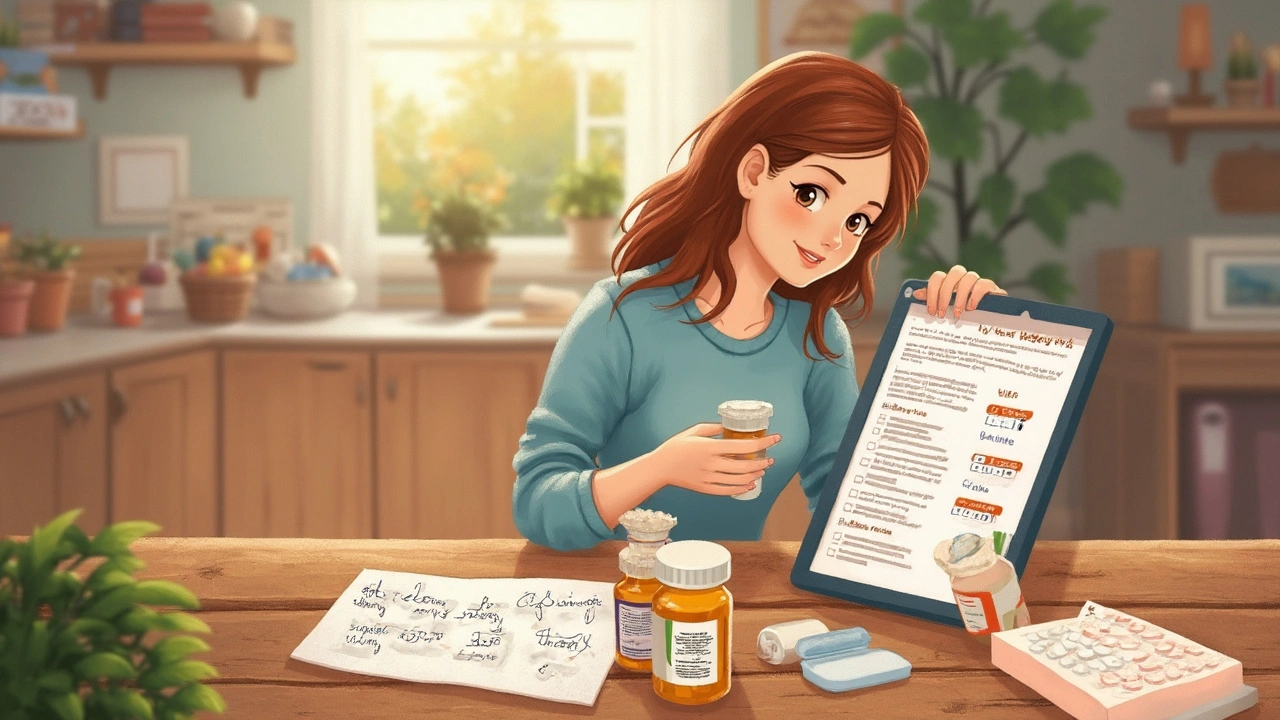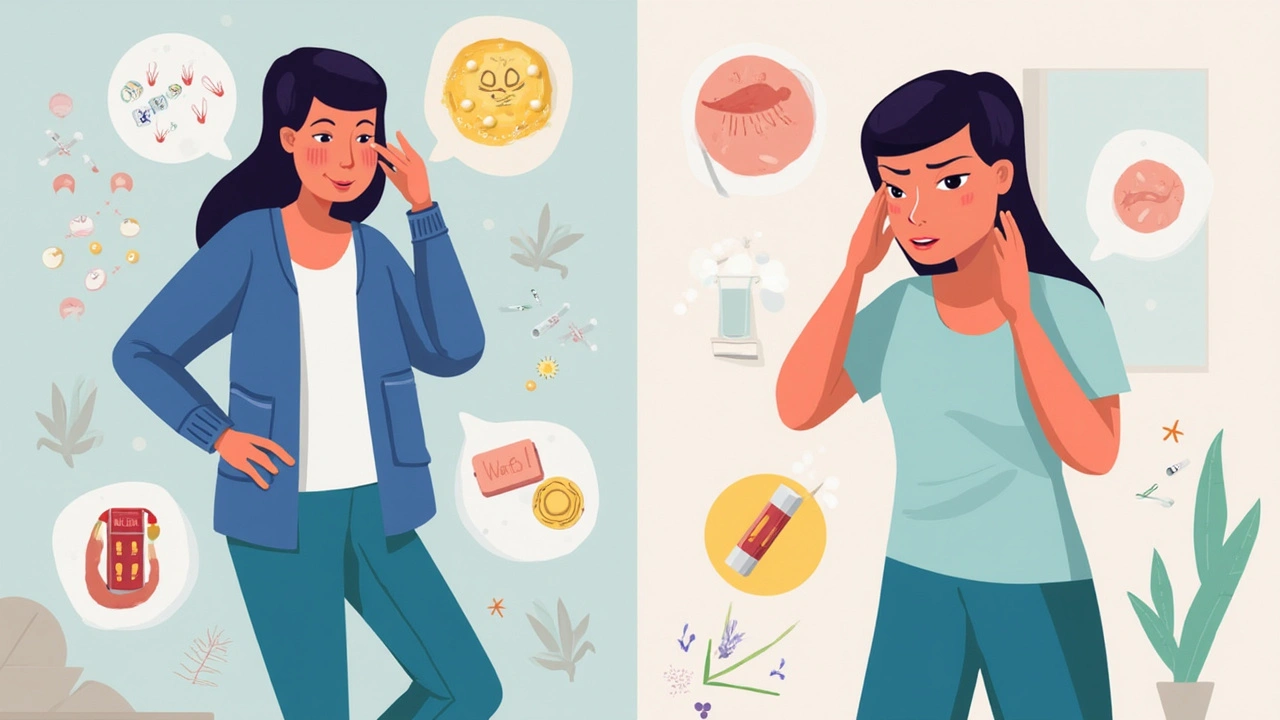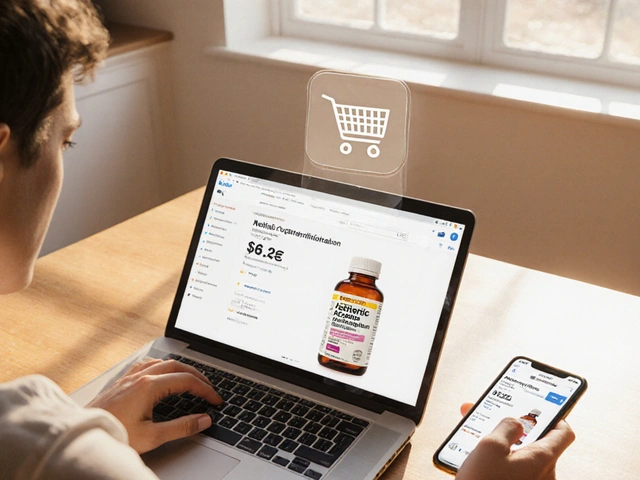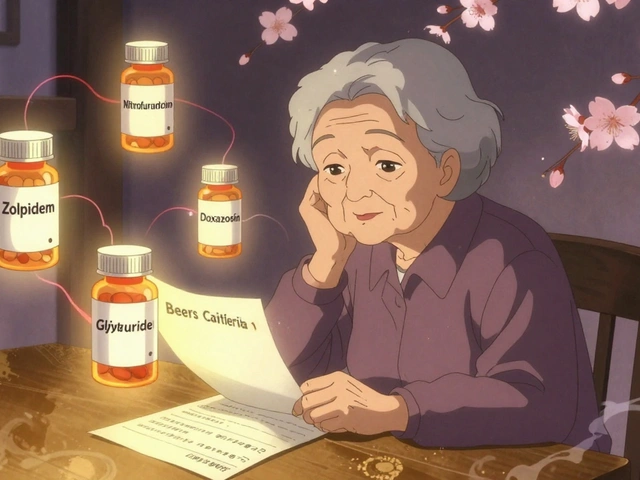
Why Hydroxyzine Shortages Happen and Why Safe Alternatives Matter
If you opened your medicine cabinet today and realized your usual hydroxyzine prescription is nowhere to be found, you’re not alone. Drug shortages keep popping up, and hydroxyzine—known for tackling anxiety, itching, and allergies—sometimes lands in the danger zone. Hospitals and pharmacies report supply gaps, especially after major pharma plant inspections or when demand spikes outpace production. In 2023, for example, the FDA listed more antihistamines and anxiolytics as 'currently in shortage' than at any other time in the past decade. That’s a headache, especially if you rely on hydroxyzine to get through the day—or night.
Hydroxyzine is a first-generation antihistamine and anxiety therapy. Docs like it because it’s fast and doesn’t tangle with benzos or heavy sedatives. But here’s the catch: not just any old allergy med can fill its shoes. Some folks try random OTC options, only to discover those barely scratch the itch or calm the nerves. Picking the wrong alternative, or guessing on dosing, can leave you drowsy or—worse—unprotected from your symptoms.
Let’s get real. Hydroxyzine’s two main forms are hydroxyzine hydrochloride (Atarax) and hydroxyzine pamoate (Vistaril). They're mostly interchangeable in their effects but aren’t always on the same pharmacy shelf. When the shortage hits, patients and pharmacists need a well-matched substitute—not just ‘something similar’ but something that covers itching or anxiety at a dose that actually works. That’s why knowing your dosing equivalents and safe alternatives is not just convenient—it’s crucial for your health.
What you might not realize: many pharmacies lean on prescription networks, so national shortages often mean regional ones. The situation can change overnight. If you suddenly can’t refill hydroxyzine, you need a back-up plan fast. Plus, some doctors may recommend shifting to a different class of medications, so the dosing won’t be a straight one-to-one conversion. And if you’re sensitive to meds, even a small change might throw you off.
The good news? With a little know-how, you can work with your pharmacist to find an alternative that fits your needs and your routine—without putting yourself at risk of underdosing, overdosing, or unwanted side effects.

Pharmacist-Recommended Hydroxyzine Alternatives—And How to Convert Your Dose
If you can’t get hydroxyzine, don’t panic. There are both over-the-counter (OTC) and prescription (RX) options that can step in for allergy relief, itching, and sometimes anxiety. The trick is picking the right one for your specific symptom—and getting the dosing right. Here’s how pharmacists approach this problem.
First, for allergies and itching, OTC antihistamines are usually everyone’s first stop. Diphenhydramine (Benadryl) is the classic substitute—it’s also a first-generation antihistamine, meaning it’s chemically similar. But let’s compare dosing: standard hydroxyzine doses range from 25mg to 50mg taken up to four times a day. Benadryl clocks in at 25mg every 4 to 6 hours, maxing out at 300mg a day for adults. On paper, a 25mg Benadryl tablet roughly matches a 25mg hydroxyzine, but Benadryl tends to cause more next-day drowsiness and wears off faster.
For younger patients or people sensitive to side effects, newer OTC antihistamines like cetirizine (Zyrtec) or loratadine (Claritin) are available. They don’t touch anxiety, but they’ll usually keep hives and sneezing in check. The dosing here is totally different: 10mg once daily, which is potent for allergies but less sedating than hydroxyzine. But here’s the rub—these drugs don’t cross the blood-brain barrier as much, so they won’t be as calming or sedating. If anxiety or sleep is your main concern, these won’t cut it.
Now, what about anxiety? Prescription options are more nuanced. Hydroxyzine is often used as an as-needed calming agent. The closest RX substitutes include trazodone (for sleep), doxepin (for both itching and anxiety), or in some cases, prescription-only sedating antidepressants. The conversion gets tricky—doxepin is about 10x more potent for itching but comes with more side effects. Trazodone is typically dosed much higher (25-100mg at bedtime for sleep) but isn’t a direct antihistamine.
Pharmacists will usually recommend starting at the lowest possible substitute dose and adjusting upward until symptoms are managed—or stopping if you get too drowsy. Here’s a quick snapshot of common alternatives and how they stack up:
| Medication | Use | Starting Adult Dose | Notes |
|---|---|---|---|
| Benadryl (diphenhydramine) | Itching, allergies | 25-50mg every 4-6 hrs | More sedating, shorter action |
| Zyrtec (cetirizine) | Allergies, mild itching | 10mg daily | Non-sedating, not for anxiety |
| Claritin (loratadine) | Allergies, mild itching | 10mg daily | Least sedating, not calming |
| Doxepin (RX) | Itching, anxiety | 10-25mg at bedtime | Potent antihistamine, more side effects |
| Trazodone (RX) | Anxiety, sleep | 25-100mg bedtime | Not for allergies/itching |
If you’re switching from hydroxyzine 25mg at bedtime for sleep, your pharmacist might suggest starting with 25mg Benadryl or 10-25mg doxepin at bedtime, adjusting based on your response. For allergy-only needs, one 10mg Zyrtec or Claritin daily may suffice. But if you have chronic or severe anxiety, none of these OTC meds will touch the symptom—you’ll need to ask your provider about a different prescription strategy.
You can also check out a practical rundown of hydroxyzine over the counter equivalent options for even more details about what’s available with or without a prescription.
What about kids and older adults? This is where dosing mistakes can get dangerous. Hydroxyzine is usually dosed by weight in kids—OTC subs like Benadryl or Zyrtec should be, too. For older adults, even a single dose can cause confusion or falls. Always check dosing charts or talk to your pharmacist before swapping meds. And don’t just double up on your usual allergy pill thinking it will replace a sedative like hydroxyzine—it won’t, and you could land yourself in a world of side effects, from severe drowsiness to rapid heart rate.

Insider Tips: Making the Switch Safely and Managing Symptoms During a Hydroxyzine Shortage
Changing meds is more than just swapping pills—your body can react to the new stuff in surprising ways. If you were using hydroxyzine for anxiety, for example, an OTC allergy med won’t have the same calming effect. You might notice insomnia, irritability, or breakthrough itching if you don’t choose the right substitute or forget to adjust the schedule.
Timing matters a lot. First-generation antihistamines like Benadryl work fast but last only a few hours, so you may need to dose more often. Second-generation options (Zyrtec, Claritin) are once-a-day but might take a couple of days of regular use to fully kick in for hives or allergy relief. If you’re nervous about getting too sleepy at work or school, consider taking your dose right before bedtime—even if symptoms hit during the day, sedation peaks in the hours after dosing.
Always watch for side effects when you try a new med. The biggest risks with OTC antihistamines are drowsiness, dry mouth, constipation, and blurred vision. For prescription substitutes, headaches and lightheadedness can pop up. If you’re prone to heart disease or high blood pressure, check with your doctor before making any switch—some meds, especially first-generation antihistamines, can throw your heart rhythm off.
If your symptoms were well-controlled on hydroxyzine but spike after the switch, jot down your new schedule. Note the time, dose, and how you felt after each dose. Bring this info to your pharmacist—they’ll know if you’re getting too much or too little. Never ‘stack’ substitutes unless told to do so by a professional. For example, taking Benadryl on top of a new prescription sedative is a recipe for grogginess or worse.
Just ran out and can't call your doc right away? Use the minimum effective dose of your chosen OTC alternative, and don’t exceed the label’s daily max. That’s not just lawyer talk—antihistamine overdose is more common than you’d think. And don’t go near alcohol or other sedating meds when switching; the sleepy side effects add up fast and can lead to falls or blackouts.
Be careful with combining allergy remedies, too. Many cold and flu meds sneak in extra antihistamines—check the ingredients before doubling up by accident. And watch for unexpected drug interactions if you take other prescriptions; hydroxyzine and its substitutes share metabolism pathways with many common heart or mood meds.
If you find nothing is working—or if your symptoms get worse—don’t just power through it. Let your prescriber know. Temporary blending of two alternatives is sometimes needed, but only under medical supervision.
If you’re managing a chronic allergy or itch condition, now is a great time to ask about longer-term management. Lifestyle changes—like skipping processed foods high in histamine, using air purifiers, or wearing loose cotton clothing if you’re itchy—won’t replace your medication, but they do help cut flare-ups while you wait for the real stuff to come back in stock.
Keen to stay prepared? Consider joining your pharmacy’s shortage alert system or using apps that track when your regular meds are running low on supply. Many chains offer text or email updates. That way, you’re the first to know—and can plan ahead with your care team.
Drug shortages are frustrating, but swapping hydroxyzine safely is possible with a little info and support. Picking the right alternative—and matching the dose to your body and your symptoms—is your best shot at staying healthy until those familiar green tablets return to the pharmacy shelf.





Jaspreet Kaur
April 30, 2025 AT 20:57Gina Banh
May 1, 2025 AT 20:41Deirdre Wilson
May 3, 2025 AT 04:58Ryan C
May 4, 2025 AT 02:38Dan Rua
May 5, 2025 AT 04:03Mqondisi Gumede
May 7, 2025 AT 03:33Douglas Fisher
May 8, 2025 AT 03:17Albert Guasch
May 9, 2025 AT 06:31Ginger Henderson
May 11, 2025 AT 02:15Bethany Buckley
May 12, 2025 AT 22:49Stephanie Deschenes
May 13, 2025 AT 05:05Cynthia Boen
May 14, 2025 AT 06:08Amanda Meyer
May 14, 2025 AT 19:54Jesús Vásquez pino
May 15, 2025 AT 14:56hannah mitchell
May 16, 2025 AT 02:34vikas kumar
May 17, 2025 AT 09:42Vanessa Carpenter
May 18, 2025 AT 11:16